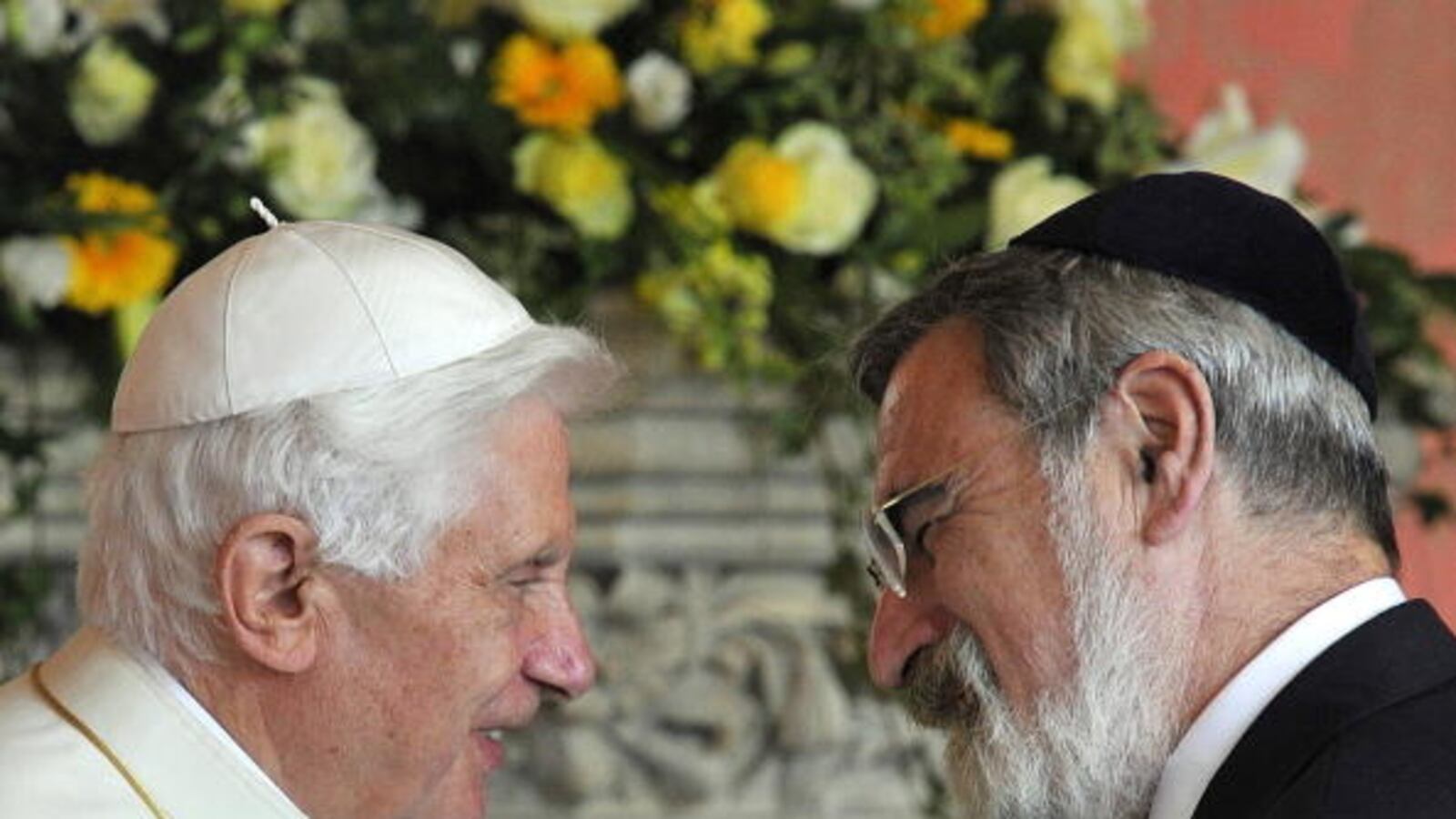Last week, French ultra-nationalist politician Marine Le Pen called for a kippah ban, and German legislators wrangled over circumcision. A rough hour for European Jewry; an hour when they need a spokesman, an ambassador. It is thus somewhat baffling that England’s search for a chief rabbi—a position which, at least under Lord Jonathan Sacks, became a bully pulpit for European Jewry—has become entangled with the Republican party. (A party which, I gather, is of late not terribly popular in Europe.) Yet that’s what happened. The likeliest candidate, Rabbi Meir Soloveichik (of whom, I should say, I was briefly a student), is famous for his Republican convention invocation and for representing Yiddishkeit on the infamous all-male contraception panel. Which leads to the question: How exactly did Orthodox Judaism become so closely identified with the political right?
It wasn’t always this way. Meir Soloveichik’s grandfather, the famous Chicago scholar Rabbi Ahron Soloveichik, was a fierce opponent of the Vietnam War. Not that I’m holding him out as a model of progressive Orthodoxy. Interestingly, the elder Soloveichik combined staunch Democratic loyalty with opposition to the Oslo peace accords—so not exactly a lefty. Rather, he exemplified a now-endangered type: the Orthodox Jew who partitions his participation in the civic, American, public sphere from his religious loyalties and commitments as a Jew.

To really understand that type, and how things have changed, you need to read yet a third Soloveitchik, Ahron’s brother, the great theologian Joseph Ber Soloveitchik. In an influential 1964 article in the journal Tradition, Joseph Ber Soloveitchik addressed the question of interfaith dialogue. He came out firmly against, but the resulting argument is most interesting as a record of a deeply dichotomous sense of what it meant to be an American Jew. “We Jews have been burdened with a twofold task,” Soloveitchik wrote. “We think of ourselves as human beings, sharing the destiny of Adam in his general encounter with nature, and as members of a covenantal community which has preserved its identity under most unfavorable conditions, confronted by another faith community.” Soloveitchik rejected interfaith dialogue because he believed those were fundamentally separate categories: “the word of faith reflects the intimate, the private, the paradoxically inexpressible cravings of the individual…the numinous character and the strangeness of the act of faith of a particular community which is totally incomprehensible to the man of a different faith community.”
Now, say what you want about interfaith dialogue: Soloveitchik was spot-on in his read of how mid-century Orthodox Jews approached the public sphere. They did not see their Jewishness as part of their public life. Rather, they saw the public, secular sphere as trying to swallow their religiosity, which needed to secede and assert its separateness. For Joseph Ber Soloveitchik, the shared Judeo-Christian tradition—which Meir Soloveichik touts so freely in his speech—exists “under [a] historico-cultural aspect,” but is religiously frightening, threatening assimilation.
So what changed? The New Left, of course, made diversity cool. And while assimilation remains a live fear for most American Jews, Modern Orthodoxy has flourished and has a comparatively secure future. But most importantly, if Orthodoxy’s attitude to the broader culture has shifted from secessionism to interventionism (Meir Soloveichik’s assertive “We Americans unite faith and freedom in asserting that our liberties are Your gift, God, not that of government”), it’s done so because of a similar, much larger shift in American Evangelical Christianity.
In the late seventies and eighties, led by charismatic leaders like Jerry Falwell, evangelicals stepped firmly into the political sphere. Reacting to Roe v. Wade and what they saw as a broader breakdown of social norms, evangelicals became newly politically savvy and active: they registered voters and built PACs, and they also established parallel institutions (law schools, home-schooling) intended to build a Christian movement that self-consciously aimed to “retake America.” Christianity became not just a private experience, but the basis of a public political project.
Orthodoxy today, I think, is catching up. Here in Jerusalem, I registered for an absentee ballot with a lovely Orthodox woman under a banner reading “I Vote Israel.” No dichotomy there: Judaism just is politics. You see it on the liberal fringe too. Orthodox social-justice group Uri L’Tzedek holds street protests in solidarity with beleaguered workers; their Judaism, too, is political. Even Occupy Wall Street’s enormous Kol Nidre service (I’ll pass over the disclosures on this one, lest they turn into a twisted game of Jewish geography) was spearheaded by the self-styled “Orthodox Anarchist” Dan Sieradski.
In some ways, I suppose, it’s refreshing (even if most of the time Orthodox activism looks more like Meir Soloveichik than like me). Secessionism splits people into parts, artificially separating the voting booth from the synagogue pew. Interventionism is inherently more about whole religious people.
Still, when I look at Europe, I wonder about the costs of politicizing Judaism. The English Chief Rabbi, as Rabbi Sacks puts it, is “an official spokesman…who represents the community vis-à-vis the public…a kind of semi-ambassadorial role.” For good and for ill, that spokesman partially defines, to an average English person, her Jewish neighbors. Someone who’s never heard that Jews bless wine and bread on Friday night may know only that Jews bless Mitt Romney and Paul Ryan at Republic Conventions—which strikes me as pretty problematic.
Judaism in England—and in Europe more generally—is still something separate from the public. As the fights over circumcision and kippot indicate, Judaism there is a minority way of life. Jews are distinct from the rest of society, on which they rely for tolerance and respect. That’s why they need a spokesperson. But for just that reason, maybe it’s not such a great idea for the Jewish ambassador to also be an ambassador for the Republican party.





